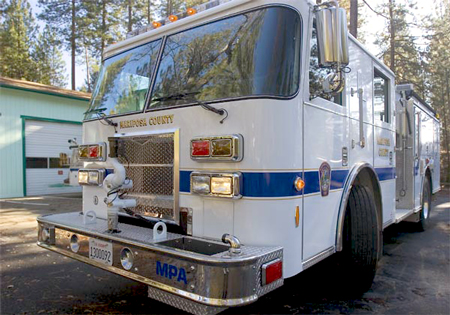Mariposa County Fire Department Call Log
 MCFD call log consists of 14 stations located throughout the
MCFD call log consists of 14 stations located throughout the
Mariposa community responding to countywide incidents.
Monday, December 5 thru Sunday, December 11
 MCFD call log consists of 14 stations located throughout the
MCFD call log consists of 14 stations located throughout theMariposa community responding to countywide incidents.
Monday, December 5 thru Sunday, December 11
EMS - 6
Fires - 0
Public Assists - 2
Auto Collisions - 1
Mariposa County Fire Department supports the county with 14 volunteer stations located throughout the county. If you are 18 years of age and possess a valid CA driver’s license, we would love to hear from you! Positions are available for fire, medical, and various support duties. No experience necessary – we will train you! – Please call (209) 966-4330 today for more information!
Safety Tips for Carbon Monoxide Alarms
The following information was obtained from the Consumer Product Safety Commission. Carbon monoxide, also known as CO, is called the "Invisible Killer" because it's a colorless, odorless, poisonous gas. More than 150 people in the Unites States die every year from accidental non-fire related CO poisoning associated with consumer products, including generators. Other products include faulty, improperly-used or incorrectly-vented fuel-burning appliances such as furnaces, stoves, water heaters and fireplaces.
Have the heating system (including chimneys and vents) inspected and serviced annually by a trained service technician. Examine vents and chimneys regularly for improper connections, visible cracks, rust or stains. Look for problems that could indicate improper appliance operations: Decreased hot water supply, furnace unable to heat house or runs continuously. Sooting, especially on appliances and vents, unfamiliar or burning odor, increased moisture inside of windows. Operate portable generators outdoors and away from open doors, windows, and vents that could allow CO to come indoors.
In addition, every home should have a CO alarm in the hallway near the bedrooms in each separate sleeping area. The CO alarms should be certified to the requirements of the most recent UL, IAS, or CSA standard for CO alarms. Test your CO alarms frequently and replace dead batteries. A CO alarm can provide added protection, but is no substitute for proper installation, use and upkeep of appliances that are potential CO sources.
The initial symptoms of CO poisoning are similar to the flu (but without the fever). They include: headache, fatigue, shortness of breath, nausea and dizziness. If you suspect that you are experiencing CO poisoning, get fresh air immediately. Leave the home and call for assistance from a neighbor’s home. You could lose consciousness and die from CO poisoning if you stay in the home. Get medical attention immediately and inform medical staff that CO poisoning is suspected. Call the fire department to determine when it is safe to reenter the home.
The following information was obtained from the Consumer Product Safety Commission. Carbon monoxide, also known as CO, is called the "Invisible Killer" because it's a colorless, odorless, poisonous gas. More than 150 people in the Unites States die every year from accidental non-fire related CO poisoning associated with consumer products, including generators. Other products include faulty, improperly-used or incorrectly-vented fuel-burning appliances such as furnaces, stoves, water heaters and fireplaces.
Have the heating system (including chimneys and vents) inspected and serviced annually by a trained service technician. Examine vents and chimneys regularly for improper connections, visible cracks, rust or stains. Look for problems that could indicate improper appliance operations: Decreased hot water supply, furnace unable to heat house or runs continuously. Sooting, especially on appliances and vents, unfamiliar or burning odor, increased moisture inside of windows. Operate portable generators outdoors and away from open doors, windows, and vents that could allow CO to come indoors.
In addition, every home should have a CO alarm in the hallway near the bedrooms in each separate sleeping area. The CO alarms should be certified to the requirements of the most recent UL, IAS, or CSA standard for CO alarms. Test your CO alarms frequently and replace dead batteries. A CO alarm can provide added protection, but is no substitute for proper installation, use and upkeep of appliances that are potential CO sources.
The initial symptoms of CO poisoning are similar to the flu (but without the fever). They include: headache, fatigue, shortness of breath, nausea and dizziness. If you suspect that you are experiencing CO poisoning, get fresh air immediately. Leave the home and call for assistance from a neighbor’s home. You could lose consciousness and die from CO poisoning if you stay in the home. Get medical attention immediately and inform medical staff that CO poisoning is suspected. Call the fire department to determine when it is safe to reenter the home.
